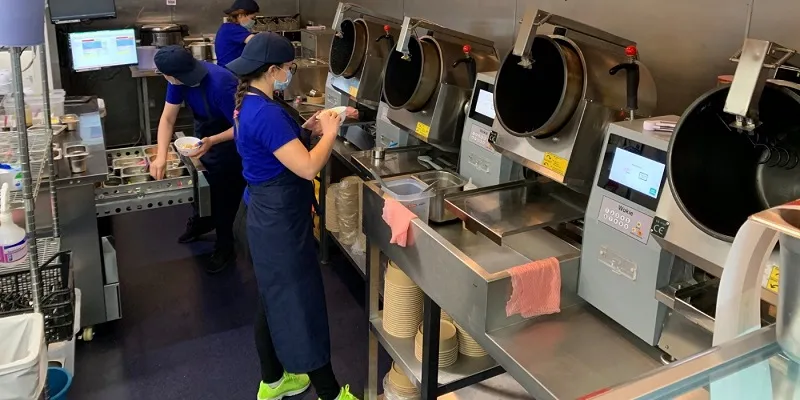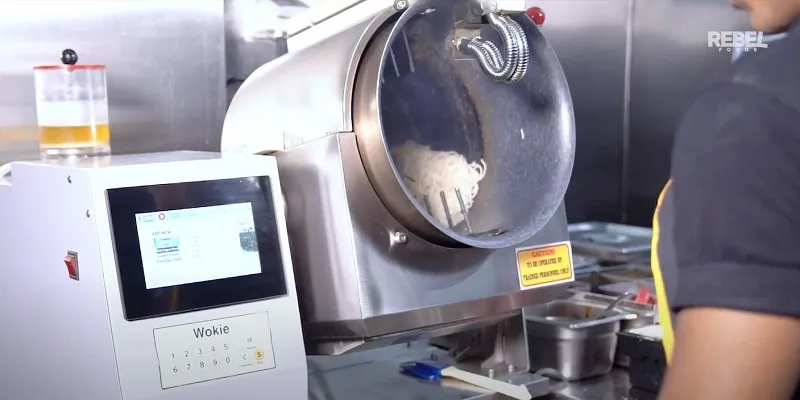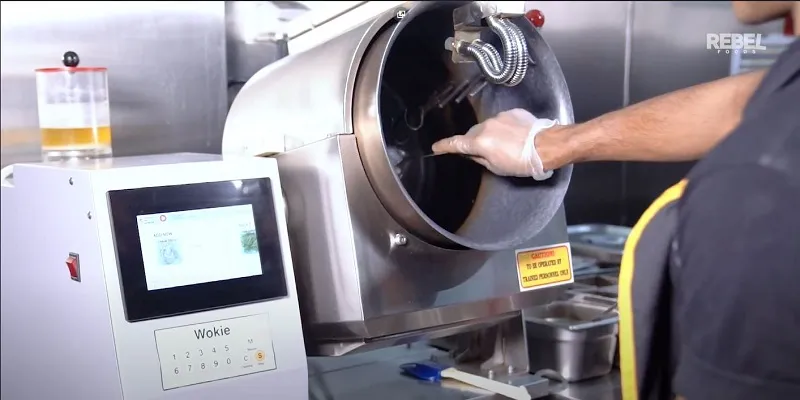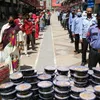Intelligent wok, an automated fryer, and a kitchen station with visual AI: how Rebel Foods is tapping IoT to scale
The future of Rebel Foods and its numerous dark kitchens is bright, courtesy technology. Working with AWS, the online restaurant company has built an IoT platform that allows it to automate cooking processes, and keep track of inventory, procurement, manufacturing, warehousing, and more.
Rebel Foods believes that it was born of the marriage of great food and innovative tech.
At present the largest cloud kitchen restaurant chain in India, the company began life as a brick-and-mortar business with one brand, , in 2011. It soon transitioned all outlets to cloud kitchens and now runs more than 350 cloud kitchens with popular brands such as Behrouz Biryani, Mandarin Oak, Oven Story, and Sweet Truth in India, and a clutch of other brands in the UAE, South East Asia, and the United Kingdom.
Ten years down the line, the Mumbai-based dark kitchen company is keen to take things further by leveraging IoT, AI, and robotics in all its cloud kitchens.
Modern technology, including computer vision and AI, is helping chefs at Rebel Foods to automate the process of cooking, courtesy the intelligent equipment – a robotic wok and dum machine, and automated tawas and auto fryers.
All this automation is part of stage one of Rebel Foods’ tech rollout plan. The intelligent machines have presently been installed in 50 kitchens, and the cloud kitchen operator plans to roll them out in 100 more kitchens in FY22.
Soumyadeep Barman, Chief Product Officer, co-founder, Rebel Foods, says the foodtech startup has solved several problems through technology.

Soumyadeep Barman, co-founder of Rebel Foods
“We created a tech platform that works as the core. Culinary delight and technology are the two big pieces inside our operating system’s puzzle. From procurement and warehousing to supply chain, kitchen ops, and delivery, everything runs on a platform that has been built in-house by our tech and product teams. This platform runs at a base level wherever we operate, be it India, Indonesia, Dubai, UK, or Malaysia, and includes everything from orders and delivery to customer management and learning management,” Soumyadeep says.
The early platform
The Rebel Foods platform has integrated multiple microservices over the last few years. For example, there are microservices for learning management, HR, payroll, or end-to-end kitchen management.
Soumyadeep says: “Our platform is the base layer on which everything else is built. Everything is connected - inventory, procurement, materials, manufacturing, warehousing, supply chain management, kitchens, and delivery. We manage multiple channels for all our brands like Behrouz, Faasos, and OvenStory, which have separate websites and apps, along with a mother app.”
Amidst the COVID-19 pandemic, the cloud kitchen operator put in place several checks and balances in all kitchens. The tech helped check who was handling food, who was entering and exiting the kitchen, and ingredient data of each product that went out.
Rebel Foods kitchens are de-skilled, which means individuals with no real experience can use technology to churn out multiple cuisines. This helps company scale without being dependent on expensive chefs.
The importance of data
The company has been running high-speed kitchens for a while now. But it was data that led Rebel Foods there. Data helped realise that 80 percent of orders were for delivery, and led to the pivot to dark kitchens.
Delivery started with the Faasos brand, and led to the launch of a multi-brand format.
"Our main question was how do we reduce costs? How do we build customer experience? All these questions led to innovation and where we are today. Nothing was forcefully done, but those things came in as levers for us to sustain and great customer experience,” Soumyadeep says.

Automated Dark Kitchens used the robot named Wokie built by Rebel Foods
He adds that de-skilling was an opportunity for the online firm as it operates around 12-15 brands from each cloud kitchen. “We realised de-skilling had to be done. We have a function called Culinary Innovation Centre where we have great chefs. In the entire organisation, we have only 10 chefs who build great dishes that our customers love. We then breakdown each recipe, create processes and SOPs, and give it to the kitchens to deliver. One person who can create a Behrouz Biryani recipe can also do that with OvenStory, Faasos, and so on. Everyone is multi-skilled,” he says.
Smart woks and visual AI
Rebel Foods kitchens are outfitted with learning management systems and smart machines. A display system lets you see recipes and figure out the steps to create a Behrouz Biryani or a Mandarin Oak recipe. The cloud kitchen operator then plugged this learning into automated machines.
A couple of years back, Rebel Foods also set up a Transformer Team, which is tasked with “transforming kitchens” with a mix of the application of robotics and automation. Robotics engineers, mechanical engineers, and mechatronics industrial designers with labs have found their way into the kitchen. The marriage of art and science means machines cannot sustain without chefs and the chefs can’t find their way without the machine/science.
"For example, with Mandarin Oak, we have built a smart wok that is connected to the IoT platform; the AWS team helped with this. We had AWS developers working with Rebel Foods developers to build something that has not been seen in this industry,” he says.
Rebel Foods’ chefs are not specialists in Chinese cuisine, but the machine takes over and eases things. The intelligent wok, which comes with a display, allows chef to do the tossing needed for Chinese cooking based on the display's instructions. The wok is connected to the Rebel Foods’ IoT platform through gateways.
The chefs can put in the ingredients and the wok tosses as per the specifications. In case a new product is introduced, the chef must input the recipe, temperature, ingredients and more. The smart wok then takes over and processes the recipe; this automated approach ensures consistent taste.
Even the popular Behrouz Biryani is not made in a handi; it is prepared with set specifications to ensure consistency.
For Rebel Foods, consistency in food is vital, in India, the UAE, Indonesia, or the UK. Cooking instructions might change depending on the flavour/taste profile in that particular region/geography but everything else remains the same.
"We have 3,500 internet restaurants in more than 35 cities, but they are all connected on the platform. The software layer and the hardware layer connect through our IoT platform. Apart from this, we have also connected our chillers, freezers, and everything in the kitchen through kitchen monitoring systems. This is an added layer on top of the IoT,” Soumyadeep says.
“We are also conscious of not using preservatives, and give utmost importance to food safety. So we have invested in this platform that tracks all equipment in the kitchen and its health. Visual AI ensures we don't need hundreds of people to monitor 350-400 odd kitchens. They are automated through AI.”
Rebel Foods presently runs 400 kitchens across the world, with 350 of them in India. Each kitchen offers more than 10 brands, which add up to 3,500 internet kitchens for the customer.
The technology keeps learning
Rebel Foods built its smart kitchen platform in-house, partnering with AWS.
Other innovative equipment that’s available to their chefs includes a machine that can bake any kind of bread ad a fryer that automatically adjusts the temperature and time of frying. These smart devices help ensure consistency and improve quality.
The platform now gathers every bit of available information from inventory, financial governance, learning management system, kitchen management system, IoT, websites, and mobile apps. It has 40-odd tech products that work in tandem.
The online restaurant company aims to continue building these machines to increase throughput consistency and ensure quality.
"We built the microcontroller chipsets and the sensors. The IoT platform was built-in house as was the hardware sensor base. The next question was how to connect the software and hardware. AWS helped us do that. We connected them through AWS IoT to gateways that we built internally,” Soumyadeep says.
The future
The company has automated sealing machines and is currently building a sealing machine that can seal 100 percent biodegradable, compostable packaging. Its engineers have also built Smart Quality Control on the visual AI platform – this ensures that every package being created in the kitchen has a barcode. Every barcode has the product ID and order ID, and when the chef scans through the Smart QC machine, it measures for size, weight, appearance, and temperature of a particular product.
The machine reveals whether the product can be served or not, if it can be delivered or not. “It's a gatekeeper. We compared our kitchens that have this machine with ones that don’t…on a scale of 5, there is an increase of 0.3 points in customer rating for kitchens with this machine,” Soumyadeep says.

Wokie by Rebel Foods, a automated wok in their dark kitchens
The QC machine, albeit expensive, tells the corporate team which restaurant suffers from quality. And as the company eyes further scale – be it the number of brands or its footprint – this is important to have more control over the product.
“Whatever we do, we look at it from a customer lens. It might require some amount of capex and investment in people, teams, and machines, but at the end of the day, we want our customers to love our products,” Soumyadeep says.
Rebel Foods looks at three metrics when considering the ROI: the customer footprint, convenience, and quality.
Smart kitchen equipment helps increase throughput by freeing up the chef’s time. Instead of a regular fryer where one needs to constantly stand guard over the food being cooked, the smart fryer takes instructions and completes the cooking process on its own. It also enhances quality and consistency across 400 kitchens. The resultant standardization increases the company's capability to scale and ensures a great customer experience.
Rebel Foods recently launched in London where the manpower cost is very high. But the smart wok did away with the need to hire any skilled chef and its made-in-India technology is helping manage three brands with just two people.

Wokie by Rebel Foods, a automated wok in their dark kitchens
All Rebel Foods’ machines are built in India by the company with third-party manufacturers to creates capabilities. The manufacturers are located in Nagpur, Mumbai, Bangalore, Delhi, and Surat.
"Our journey with AWS started in 2013 and this has led to the IoT journey. We have invested a lot of money in this platform and AWS has been a partner since the beginning. We started with Amazon Route 53 then Amazon EC2, then went on to Amazon S3 and then Amazon RDS. We were among the first ones to use Amazon Aurora in India. We now use AWS Lambda, Amazon API Gateways, Amazon CloudWatch, and Amazon IoT we use a lot of services from AWS. The tech allows us to scale faster across the world, and it allows to use data to make our dark kitchens efficient,” Soumyadeep says.
Edited by Teja Lele









